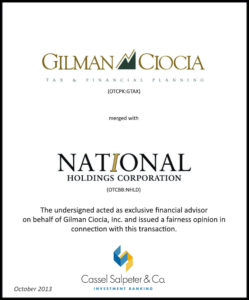Jim Cassel: Remember your priorities when selling your business
To view original article click here.
By: James Cassel
June 16, 2013
Thinking about selling your business? Think first about your employees, customers or clients, and lenders. Many business owners don’t give these key constituents the upfront attention they need as they begin to position their businesses for sale, and they miss opportunities to derive the greatest values for their businesses and reduce the potential for problems.
Fact is, planning will enable you to avoid issues that are likely to arise as potential buyers evaluate considerations related to these stakeholders, who they may consider critical to the long-term success of the business. Here are some helpful considerations for middle-market business owners interested in successfully positioning their businesses for sale:
Employees. Although employees can be a major asset during the sale process, they can be a great cause of substantial angst as companies position themselves for sale. Potential buyers believe that employees are important assets playing a vital role in the long-term success of businesses. For this reason, it is important for business owners to plan ahead and consider:
At what point should we inform our employees of a possible sale?
What members of the leadership team should be informed and how early in the process?
In addition to a strong executive management team, do we have an effective middle-management team to help ensure a seamless transition when the business is sold? How should we portray this to potential buyers?
What new contracts should we put in place to help ensure that key employees stay with the company? Should they include stay bonuses?
What current employee contracts should be amended or terminated?
Do we have in place the non-compete, confidentiality and other agreements that are necessary to protect our company’s intellectual property, proprietary information and client roster?
Does our company have strong employee morale and loyalty and should we take any steps now to improve these areas to further strengthen the business?
What messages should we be sending to employees, and how?
What steps would we take if the word gets out before we had planned?
Should we be concerned about a mass exodus of employees if they hear rumors that the company will be positioned for sale, and what message should we begin sending now to employees related to the future of the company and their careers here?
Should we give bonuses to employees after the sale to thank them for their loyalty? Keep in mind that planning ahead can enable the company to pay these in the most tax advantaged way. Former City National Bank president Leonard Abess, Jr., made headlines as “the role model for corporate responsibility” when he doled out $60 million of his own money in bonuses to 471 employees and retirees, including everything from clerical staff members to executives, following the $927 million sale of the bank.
Customers or clients. Potential buyers want to see that earnings are sustainable or growing and that the customer base is diverse enough to minimize the risk of losing customers who would flee along with the founders. Moreover, as potential buyers evaluate businesses, they consider not only revenues from customers or clients but also the types of clients and the nature of the client relationships. Some of them may know your clients and approach them to get their insights as part of their due-diligence, which can cause problems. Key considerations for business owners include:
Do we have the necessary contracts in place, or should we amend the agreements with terms that are more desirable to potential buyers? Are there change of control provisions?
Are most of our customers or clients happy and satisfied?
What percentage do we expect will continue doing business with us after the company is sold and what steps should we take now to help increase that number?
What percentage of our clients currently renew their agreements? What is the average longevity of contracts?
What types of changes in our current structure, such as A-level clients we should consider cultivating or C-level clients we should consider terminating, in order to better position the business?
What messages should we be sending clients as we position the business for sale?
How and when do we inform key customers of our plans to sell?
What do we do if the potential buyer wants to speak with our customers as part of the due diligence?
How do we respond when rumors get out about a possible sale?
How do we deal with customer concentration?
In the sale process, what do we do if a current customer wants to buy our business?
Lenders. It’s important to check relationships with your lenders and determine:
Can our existing loans be transferred to the new owners? Are there any terms in our existing loans that should be addressed before we can sell the business?
Are our loans in good standing? Are we in compliance with all of the covenants and conditions?
Are there prepayment penalties?
What loan modifications could help strengthen the business?
Are there any terms in our existing loans that could hinder a sale, and how should we address these issues? Are there change of control or due on sale provisions?
What collateral does the lender have?
Without doubt, in today’s competitive market, buyers are more skeptical and analyzing businesses more closely than ever. There is much that can be done to prepare for a sale and ensure a smoother process. Those who work with qualified advisors and plan ahead by considering their employees, customers and lenders are more likely to maximize the value of their businesses and minimize the number of headaches.
James Cassel is co-founder and chairman of Cassel Salpeter & Co., LLC, an investment-banking firm with headquarters in Miami that works with middle-market companies. www.casselsalpeter.com







